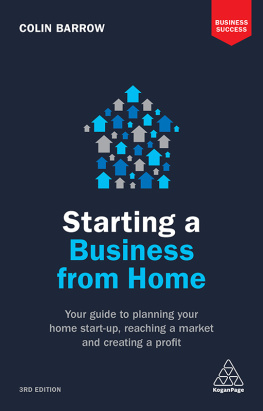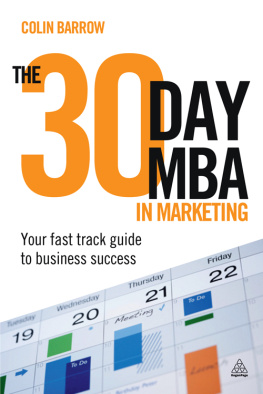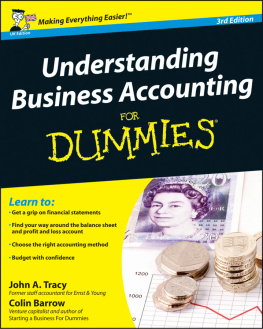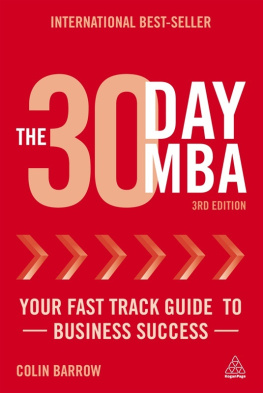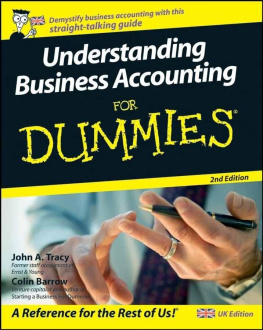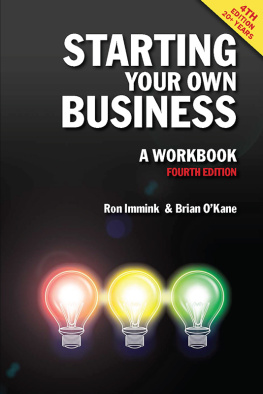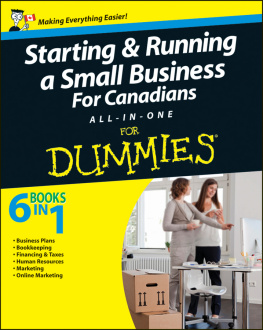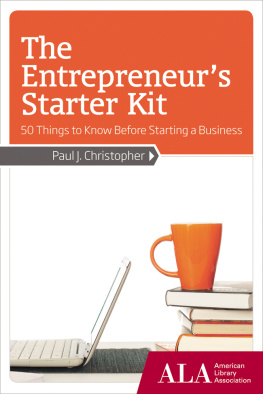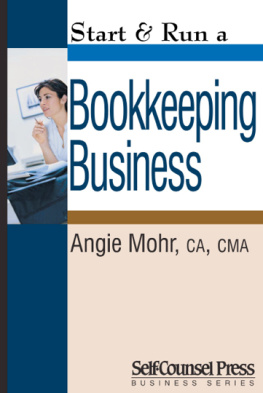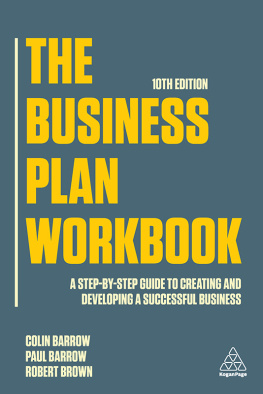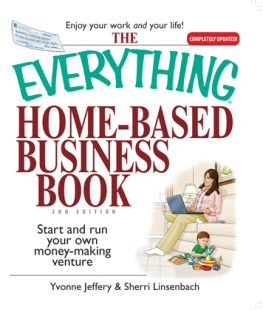
COLIN BARROW

Starting a Business from Home
Your guide to planning your home star-up, reaching a market and creating a profit

3RD EDITION
Publishers note
Every possible effort has been made to ensure that the information contained in this book is accurate at the time of going to press, and the publishers and authors cannot accept responsibility for any errors or omissions, however caused. No responsibility for loss or damage occasioned to any person acting, or refraining from action, as a result of the material in this publication can be accepted by the editor, the publisher or the author.
First published in Great Britain and the United States in 2008 by Kogan Page Limited Second edition 2011
Third edition 2017
Apart from any fair dealing for the purposes of research or private study, or criticism or review, as permitted under the Copyright, Designs and Patents Act 1988, this publication may only be reproduced, stored or transmitted, in any form or by any means, with the prior permission in writing of the publishers, or in the case of reprographic reproduction in accordance with the terms and licences issued by the CLA. Enquiries concerning reproduction outside these terms should be sent to the publishers at the undermentioned addresses:
2nd Floor, 45 Gee Street
London EC1V 3RS
United Kingdom
www.koganpage.com
c/o Martin P Hill Consulting
122 W 27th St, 10th Floor
New York, NY 10001
USA
4737/23 Ansari Road
Daryaganj
New Delhi 110002
India
Colin Barrow, 2008, 2011, 2017
The right of Colin Barrow to be identified as the author of this work has been asserted by him in accordance with the Copyright, Designs and Patents Act 1988.
ISBN 978 0 7494 8080 4
E-ISBN 978 0 7494 8085 1
Typeset by Integra
Print production managed by Jellyfish
Printed and bound by CPI Group (UK) Ltd, Croydon CR0 4YY
CONTENTS
List of Figures
List of Tables
The years since the first edition of this book in 2008 have witnessed a near collapse in world financial markets, by many standards the worst since the Wall Street crash of 1929; the first successful coalition government in the United Kingdom since the one led by Winston Churchill in 1940 to steer the country through the war years; the British decision to leave the European Union in 2016; and the election of Donald Trump, the first American President never to have held any prior political appointment since Eisenhower, a five star general Supreme Commander of the Allied Forces in Europe in WW2.
However, these macro gyrations have not daunted would-be business starters. There were approximately 5.5 million active businesses in the UK during 2016, up from 3.5 million in 2010 (www.fsb.org.uk/media-centre/small-business-statistics). The figures from around the world are similarly impressive. There are over 175 million people running their own business in the developed world. That is double the number of just two decades or so ago. GEM (www.gemconsortium.org), through their Global Entrepreneurship Monitor research programme headed up by Babson College in the United States, collect statistics across 60 economies around the world on business starters and equally importantly would-be starters.
Running your own business may seem a daunting task when you first start to gather ideas together and make tentative plans. Many would-be entrepreneurs after putting a toe in the water quickly pull back, reckoning that they dont have the skills, that their business concept is not all that compelling or that raising the money is going to be challenging, expensive and altogether too risky a proposition.
Certainly most of the people you talk to will be only too ready to pour cold water in liberal doses all over your proposed product or service. Your friends and loved ones through a sense of responsibility and perhaps even self-interest will naturally urge caution, preferring a safe regular salary to the apparent lottery of enterprise. After all, everyone knows that most new businesses fail, often causing misery and penury to founders, family, partners and anyone foolhardy enough to supply or in any way get involved.
The first useful fact to know is that the rumour of calamities awaiting most new ventures is just that an unfounded and incorrect piece of oft-repeated misinformation. An exhaustive study of the eight-year destinations of all 814,000 US firms founded in a particular year revealed that just 18 per cent actually failed, meaning that the entrepreneurs were put out of business by their financial backers, lack of demand or competitive pressures (Bruce A Kirchhoff, 1994, Entrepreneurship and Dynamic Capitalism, Praeger Publishers, Westport, CT). True, some 28 per cent of businesses closed their doors voluntarily, their founders having decided for a variety of reasons that working either for themselves or for this particular type of business was just not for them.
But the majority of the businesses studied in Kirchhoffs mam-moth and representative study survived and in many cases prospered. With a degree of preparation, a fair amount of perspiration and a modicum of luck you can get started and may even, as in the case examples in this book, become a millionaire to boot.
Working for yourself from home can seem a lonely business. Indeed loneliness is one of the most frequently quoted concerns cited to alarm prospective entrepreneurs. Paradoxically there are probably more people running their own business than there are members of almost any other profession or trade. There are certainly more entrepreneurs than there are doctors, surveyors, airline pilots or engineers. So whilst you may feel alone and maybe even that you are held in low esteem the reality is rather different.
You might be surprised at the number of people and organizations that appear keen to help you get your business up and running. In there is a directory of such organizations, prominent amongst which is the government. None of these would-be helpers is particularly altruistic. The government needs you, as new businesses create most of the new jobs in any economy, a fact uncovered by David Birch, a researcher at Massachusetts Institute of Technology (MIT) back in 1979 (The Job Generation Process, MIT, Cambridge, MA) and corroborated by dozens of other studies since then. Also of course you will pay tax on your profits and become an unpaid tax collector for VAT or sales tax on behalf of government agencies.
New businesses are also the main source of innovations, with around 60 per cent of all commercially viable inventions born in new businesses. So venture capital firms looking for superior returns need a steady flow of new businesses to back. Even conservative lending banks see those creating new businesses as being a target worthy of aiming for. Whilst home banking is still largely free, banks rely on business clients to make their money from.

